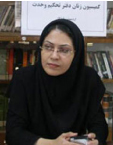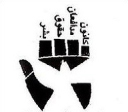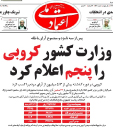Freedom of Expression and Association – Distortion & Disinformation
Criticizing Government Officials
Charlie Rose: Is anybody challenging the leader [Ayatollah Ali Khamenei] in Iran?
Larijani: Oh, definitely yes. Definitely. I mean, nobody is immune from challenge.81
– Mohammad-Javad Larijani, interview with PBS, 16 December 2010
[Criticizing the] government does not have any trouble. I mean, against government every day there are hundreds of different claims.82
– Mohammad-Javad Larijani, interview with NBC News, 19 November 2010
Despite Larijani’s assertions, authorities routinely suppress free speech, undermine press freedom, and punish public criticism of the government and high-ranking state officials. Dozens of newspapers and websites have been banned and scores of Iranian journalists and bloggers have been arrested since June 2009, mostly after criticizing government officials or official policy.
As Ali Motahari, a conservative Member of Parliament, said to Soroush Weekly in August 2010 about freedom of speech in Iran:
Right now, if you criticize high-ranking officials of the government, it won’t get published. Whichever newspaper wants to publish this criticism will be banned or if a website wishes to publish this kind of talk, it will get into trouble. For the past several months, none of the interviews I have done have been published in full. … Wherever there is the probability that the President or his cabinet might feel insulted, the content is taken out. We ask [the publications] “Why did you take it out?” They say, ‘”If we print it, they’ll ban our newspaper.” … Unfortunately, the atmosphere is closed. There is an atmosphere of suffocation. Up until a year ago, things could be said more freely, but now the circumstances have changed.83
Activists are often specifically charged and sentenced under vague offences such as “insulting the leader,” “insulting the president,” or “insulting authorities.”

“Regarding insulting the President, there were no reasons provided in the ruling. Ms. Hedayat had merely quoted statements made by others, said Bahareh Hedayat’s lawyer. “This could not be construed as her opinion or viewed as her insult on a particular individual.”
Veteran political activist Heshmatollah Tabarzadi was sentenced to nine years and 74 lashes for “gathering and colluding against national security,” and “insulting the Supreme Leader,” in October 2010.84
Branch 28 of the Revolutionary Court of Tehran sentenced student activist Bahareh Hedayat in May 2010 to nine-and-a-half years in prison, five years for “assembly and collusion against the regime,” two years for “insulting the Supreme Leader,” and six months for “insulting the President.” The court also reactivated an earlier two-year suspended sentence for participating in a 2006 gathering to protest laws discriminating against women.85
Former Parliament Member Ali Tajernia was sentenced to five years in prison for “assembly and collusion with the intent to disrupt public security,” and to one year in prison for “propagating activities against the regime,” and to 74 lashes for “insulting the country’s authorities (the President and his cabinet).”86
Journalist and member of Advar Tahkim-e Vahdat Alumni Association, Ali Malihi was sentenced to four years in prison for “acting against national security,” and payment of a cash fine for “insulting the president.”87
Authorities tried three student activists, Majid Tavakoli, Ehsan Mansouri, and Ahmad Ghassaban, in a closed trial, for “publishing and distributing student publications in which sanctities and the President were insulted.”88
Attacks on Human Rights Organizations
We very much appreciate and welcome this kind, this form of civil society engagement, and I should point out that after the revolution, more than 7,000, please note, 7,000, NGOs mushroomed in Iran. And unfortunately, very few of them had the opportunity to participate in the debate in here.89
– Mohammad-Javad Larijani during Iran’s UPR, 15 February 2010

“I asked them to produce a search warrant (when the Center was raided), but instead the commander told me, ‘My uniform is the legal basis. I don’t need to give you any warrant,’” said Narges Mohammadi, DHRC spokesperson. “Plainclothes agents attacked and intimidated guests. In one instance, they beat a member of the DHRC, on his chest and head and took his mobile telephone.”
While Iranian officials tout the growth of the NGO sector in Iran, authorities have in actuality repressed many independent NGOs such as student groups and labor unions, whose work has been critical of the Iranian government and government policy.90
Human Rights organizations are an increasingly common target of state repression. In December 2008 security officials closed the Defenders of Human Rights Center (DHRC), founded by Nobel Peace Prize Laureate Shirin Ebadi and several other prominent Iranian human rights lawyers, just a few hours before the Center planned to hold a 60th anniversary celebration of the Universal Declaration of Human Rights at its Tehran office. In 2010, authorities prosecuted and convicted several lawyers associated with the DHRC (see Section 4.2). In more than one of these cases, prosecutors used the lawyer’s affiliation with the DHRC as evidence of criminality. Mohammad Seifzadeh has been sentenced to nine years in prison for co-founding the DHRC and Mohammad Ali Dadkhah and Abdolfattah Soltani, both charged with co-founding the DHRC, have open prosecutions against them.91

“The Martin Ennals (award) to Emad Baghi for his courageous efforts helps to keep the eyes of the world on the difficult human rights situation in Iran,” said Joe Stork, deputy Middle East director at Human Rights Watch.
In September 2009, authorities shut down the Association for the Defense of Prisoners’ Rights, which monitors the ill-treatment of detainees in Iran. On 21 September 2010, Branch 26 of the Revolutionary Court sentenced Emad Baghi, founder of the Association, to a six-year prison term and five years of “civil deprivation” on charges of “engaging in propaganda against the system” and “colluding against the security of the regime.” The basis for his conviction was an interview he conducted a few years prior with dissident cleric Grand Ayatollah Montazeri.92 Emad Baghi received the highly prestigious Martin Ennals Award for human rights defenders in 2009.93
In 2009 and 2010 Iran authorities cracked down on the Committee of Human Rights Reporters (CHRR) arresting at least seven of its members by means of a “group arrest warrant.”94 In an attempt to pursue charges of moharebeh (enmity with God), which could carry a death sentence, Tehran’s prosecutor has made the highly unsubstantiated claim that CHRR is associated with the militant opposition group, Mojahedin Khalq Organization.95
Branch 26 of the Revolutionary Court in Tehran sentenced Navid Khanjani of the CHRR, on 31 January 2011, to 12 years in prison and cash fines on charges of “propagating falsehoods,” “creating public anxiety,” and “propagating against the regime through publishing news and reports and interviewing with foreign TV and radio outlets,” and “membership in the Central Council of the Committee of Human Rights Reporters.” The court also convicted Khanjani for “formation of a group for those banned from education,” for his participation in the Council for the Defense of the Right to Education (see Section 8 for more on education bans).96

Shiva Nazar Ahari’s lawyer said, “I have not been officially served the verdict and unfortunately ... I learned about the ruling through the press.”
Shiva Nazar Ahari, a member of the CHRR, received a sentence of six years in prison and 76 lashes on 4 September 2010. She was convicted of moharebeh, a charge her lawyer, Mohammad Sharif, says was not supported by any evidence in her case file. In January 2011, Branch 36 of Tehran’s Appeals Court reduced the sentence to 4 years and 74 lashes. Currently, Ahari is free on bail awaiting a prison recall.97
On 7 February 2010, Ali Kalaee, a member of CHRR, was arrested and released on 14 February. On 27 April 2010, Branch 3 of the Revolutionary Courts summoned him to appear in order to continue investigations and he has been sentenced to six years in prison.98

Mohammad Sadiq Kaboudvand’s daughter said, “My father was involved in human rights work and invited everyone to peaceful conduct. What has he done to be denied the least of rights?”
The Iranian government has also prosecuted members of Iran’s most prominent Kurdish human rights organization. Arrested in June 2007, Mohammad Sadiq Kaboudvand, founder of the Human Rights Organization of Kurdistan (HROK), is carrying out a 10-year sentence in Evin Prison on charges of “acting against national security by establishing the Human Rights Organization of Kurdistan,” “widespread propaganda against the system by disseminating news,” “opposing Islamic penal laws by publicizing punishments such as stoning and executions,” and “advocating on behalf of political prisoners.”99 On 30 January 2011, Branch 1 of the Revolutionary Court in Kermanshah sentenced Kaveh Ghasemi Kermanshahi, a member of the HROK central council, to five years in prison. Kermanshahi was tried on charges of “acting against national security” because of his membership in the HROK. He was also charged with “propagating against the regime” for news articles he wrote and interviews he gave with the media, as well as for “contacting families of political prisoners and those executed.”100
Press and Internet Freedoms
Charlie Rose: Do you feel [the] people who live in the state of Iran … should be allowed to be free, to express themselves, to enjoy human rights and to be able to protest their government and to speak against their government?
Larijani: Exactly.
Rose: All of those things, you stand for.
Larijani: All of those things. Yes.
– Mohammad-Javad Larijani, interview with PBS, 16 December 2010
“I personally believe that it is not good to close a newspaper. Closure of newspapers in our country is an ugly phenomenon … This is a very bad phenomenon.”
– Mohammad-Javad Larijani, interview with Tunisia’s Nawaat, 7 February 2005
With regard to free access to information, we are of the view that the access to the electronic technologies such as Internet with broad access, should be defined in a way that prevent dissemination of racist and xenophobic ideas as well as harmful materials such as child pornography and abuse.
– Mohammad Reza Ghaebi, delegate of the Islamic Republic of Iran at the HRC, 4 June 2010
In 2009 and 2010 authorities banned several independent newspapers, particularly reformists publications. Many journalists working for these publications were also arrested, some sentenced to prison terms and bans from journalistic activities (see Section on Journalists).
On 1 March 2010, the Press Supervisory Board shut down Etemaad, a well-known reformist publication, citing violations of Iran’s press law.104
On 21 December 2009, the Press Board banned Andisheh-No, a reformist daily run by Hojjatollah Hajebi. The publication received several warnings for insufficient reporting of certain political events, and was closed for “questioning general policies of the Islamic Republic,” as well as “a constant effort to deepen differences among people after the presidential election.”105
In November 2009, Iran’s Ministry of Culture shut down Sarmayeh, a leading reformist newspaper that covered news about opposition leaders, citing article 6 of the Press Law, which prohibits dishonoring the Islamic Republic and insulting senior clergy.106

Prominent reformist newspaper Etemaad-e-Melli, closed in August 2009. The publication was known for exposing many government abuses including the rape of detainees in Kahrizak Detention Center and discriminatory exclusion of students from universities.
Prosecutor Saeed Mortazavi also shut down the newspaper Etemaad-e Melli, belonging to presidential candidate Mehdi Karroubi, in August 2009.107 Authorities accused Etemaad-e Melli of breaching Iran’s media laws.108 The Prosecutor’s office told the publishing managar that “the newspaper’s interview with Mr. Karroubi as the head of Etemaad-e Melli party and its interviews with the head of the national Expediency Council [former president Hashemi Rafsanjani] were violations of … the Press Law as a result of which the publication of the newspaper had to be suspended.”109
On 14 June 2009, Tehran Prosecutor Mortazavi banned Kalame Sabz, the newspaper licensed to presidential candidate Mir Hossein Moussavi.110 Despite the ban, Kalame Sabz continued its publications, and authorities stormed its offices on 22 June 2009, arresting almost all of its reporters and staff.111
The Iranian government also engages in broad internet censorship aimed, in part, a blocking websites contains information and opinion critical the government In 2009 and 2010 Iranian authorities blocked dozens of blogs, political websites, and online news outlets. The websites of former president Mohammad Khatami, former prime ministry Mir Hossein Moussavi and former speaker of the parliament Mehdi Karroubi have been blocked.112 Authorities continue to block several independent online news sources, such as Gooya Online and Rooz Online.
——
Back to Main—————————————–Next Section: Ethnic Discrimination
————————————————————




